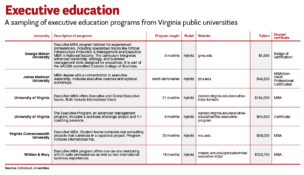Virginia AG’s office appeals university board block
Miyares seeks remedy from state Supreme Court
Kate Andrews //August 12, 2025//

The University of Virginia lawn. Photo courtesy U.Va.

The University of Virginia lawn. Photo courtesy U.Va.
Virginia AG’s office appeals university board block
Miyares seeks remedy from state Supreme Court
Kate Andrews //August 12, 2025//
Summary
- Virginia attorney general appeals ruling that blocked eight university board appointees from being seated
- GMU, VMI and U.Va. board appointees were rejected by state Senate committee
- AG Jason Miyares argues full legislature must take action for rejections to be valid
Virginia Attorney General Jason Miyares has appealed last month’s ruling that stopped three Virginia public universities from seating eight gubernatorial board of visitors appointees who were rejected by a state Senate committee.
On July 29, Fairfax County Circuit Court Judge Jonathan Frieden issued a preliminary injunction, ruling in favor of nine Virginia State Senate Democrats who sued the rectors of George Mason University, Virginia Military Institute and the University of Virginia to block them from seating the disputed appointees, who include former Virginia Attorney General Ken Cuccinelli, former state Secretary of Commerce and Trade Caren Merrick and others with significant conservative political and business connections.
Miyares’ petition filed Monday asks that the Supreme Court of Virginia vacate the injunction.
Frieden said in his ruling, which arrived three days before George Mason’s board met with President Gregory Washington to discuss his job performance, that the Senate Privileges & Elections Committee has the right to speak for the entire Virginia General Assembly during special session.
He also ruled that the nullification of the lawmakers’ votes constituted “irreparable harm,” giving the senators standing to sue the rectors.
In a June meeting, the Democrat-controlled committee voted 8-4 to reject Gov. Glenn Youngkin’s appointees for the three universities’ boards.
However, the defendants argued that the entire General Assembly has to be called to vote on the matter if the Privileges & Elections Committee wishes to reject gubernatorial appointees outside of regular session, an argument the state attorney general’s office uses in the appeal filed Monday in the Supreme Court of Virginia.
In Monday’s petition, Miyares argues that the circuit court lacked jurisdiction to issue the preliminary injunction and that the plaintiffs failed to prove irreparable harm. He also argues that the injunction prevents the “orderly governance of public universities.”
The state Senate plaintiffs and their allies, though, say that Youngkin has attempted to gain control over public universities via his board appointments, and that this is in line with the Trump administration’s strategy in using the powers of the U.S. Department of Justice and the Department of Education in its attempts to push out university leaders it disagrees with.
State Sen. Scott Surovell, the Democratic Senate majority leader, said in an email Tuesday that the attorney general “strangely argues that the the General Assembly has been confirming people in the wrong way for the last 100 years, including the six years he served in the House of Delegates, and never said anything.” A hearing date has not yet been set by the state Supreme Court.
Miyares sent letters this summer to the three rectors advising them to seat the new appointees as legitimate board members — an action that Frieden mentioned in his ruling.
“Following the legal advice of the attorney general, the defendant rectors … have continued to recognize the rejected appointees as members of their respective governing boards,” the judge wrote. “Moreover, they intend to continue to do so.”
George Mason did not seat the disputed appointees at its Aug. 1 board meeting, and VMI and U.Va.’s boards have not met since the ruling, although their disputed members are no longer listed on their board websites.
GMU President Washington’s university is the target of four investigations by the Trump administration for allegedly engaging in illegal diversity, equity and inclusion hirings and promotions and allegedly not doing enough about on-campus antisemitism. He survived the Aug. 1 university board meeting with his job intact and received a 1.5% raise.
e

















